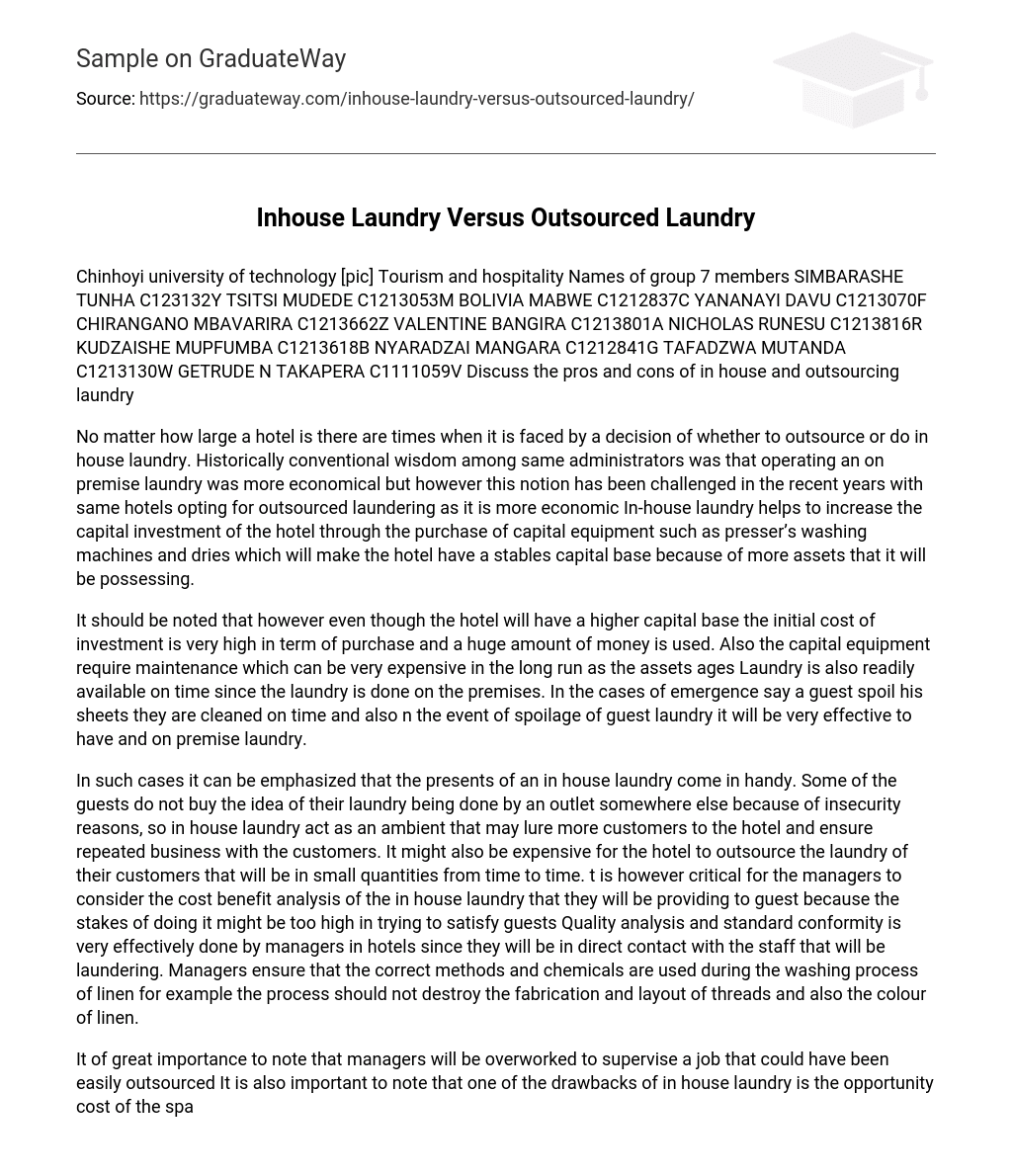Regardless of a hotel’s size, there comes a point where the decision to outsource or handle laundry in-house must be made. In the past, it was believed that having an on-site laundry was more cost-effective for hotel administrators. However, this belief has been challenged in recent years and many hotels now choose outsourced laundry services due to their economic advantages. Alternatively, handling laundry operations in-house allows hotels to make a capital investment by acquiring equipment like pressers, washing machines, and dryers. This helps establish a stable capital base with increased assets.
It is important to note that despite the hotel having a larger capital base, the initial investment cost is still very high in terms of purchasing and requires a significant amount of money. Additionally, maintaining the capital equipment can be expensive over time as the assets age. On the other hand, having laundry facilities on-site ensures that laundry is readily available and can be done promptly. In cases of emergencies, such as a guest spoiling their sheets, they can be cleaned immediately. Furthermore, having on-site laundry would be highly beneficial in the event of guest laundry getting spoiled.
Having an in-house laundry is crucial in situations like these because it emphasizes the convenience it offers. Some guests may worry about the security of their laundry when sending it to an external facility, so having an in-house laundry can provide reassurance. This feature can attract more customers to the hotel and encourage repeat business.
Outsourcing laundry services for hotel customers could be expensive due to small and intermittent quantities. Nonetheless, it is important for hotel managers to assess the cost benefit of having an in-house laundry service in order to guarantee guest satisfaction. Hotel managers have direct contact with laundry staff and are skilled at conducting quality analysis and ensuring standard conformity. They oversee the use of appropriate methods and chemicals during the washing process to prevent fabric damage or color alteration, particularly for items like linen.
It is important to recognize that managers will be burdened with work if they have to oversee a task that could have been outsourced. Furthermore, one drawback of having an internal laundry is the potential loss of opportunity for the space it takes up. Efficient use of space is particularly crucial in hotels located in city centers such as Crown Plaza, Holiday Inn, and Mikels Hotel. Laundry rooms tend to be large due to the equipment they contain. Thus, if this space was used to create a guest room instead and the laundry work was outsourced, the hotel would generate more income.
It should be noted that the hotel’s laundry service can be a draw for visitors, as it alleviates concerns about dirty laundry and ensures timely cleaning of linens. However, there are drawbacks to having an in-house laundry. It will require additional staff for the laundry section, and the hotel will have to provide security measures such as locks and uniforms. Additionally, the wages and salaries of laundry maids will increase the hotel’s operational costs.
The hotel could bear the costs of hiring more staff, but it would also benefit the community socially by providing job opportunities. This will allow the hotel to harmonize with the locals and outsource their laundry. By outsourcing, the hotel can concentrate on their main business and minimize expenses. They can switch to a variable cost model by only incurring laundry expenses for occupied rooms, aligning expenses with revenue. Additionally, they can eliminate the need to invest capital in outfitting the laundry room.
By outsourcing the laundry service, the hotel can get rid of various expenses associated with operating an On-Premises Laundry (OPL). Some of these expenses are not easily identifiable because they are integrated into the hotel’s overall cost structure and not directly linked to the laundry process. The advantages of outsourcing laundry include replacing a fixed price cost for an internal laundry with a variable cost based on the number of occupied rooms. Consequently, this leads to reduced spending and better budget management.
By implementing this system, hotels can reconcile their laundry expenses with the revenue generated from room sales. This becomes especially crucial during periods of low occupancy. The question of whether to outsource laundry services or handle them in-house has been a major concern for many hotels. However, it can be confidently stated that outsourcing laundry is the most effective approach for saving funds and ensuring seamless business operations. Additionally, hotels should allocate dedicated space for laundry services to avoid interruptions in case the outsourced laundry is unavailable.





